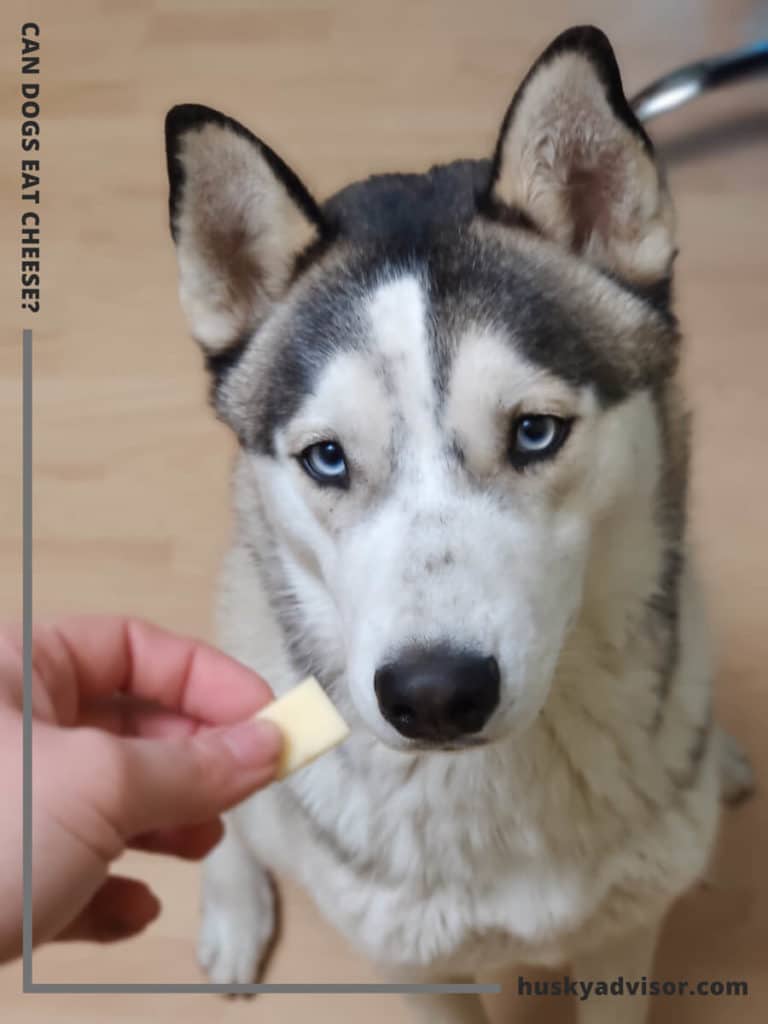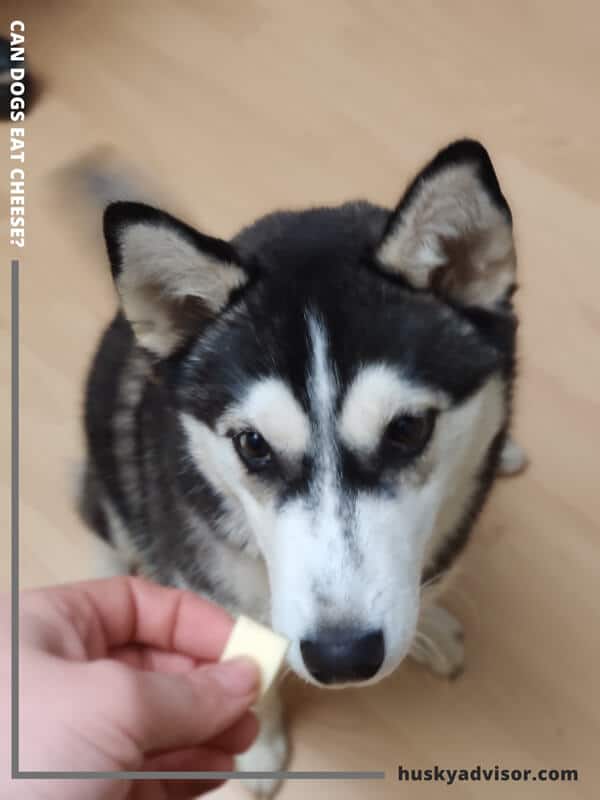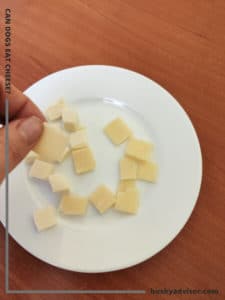Yes, dogs can eat a small amount of cheese from time to time. Most types of cheese are not toxic to dogs and you can safely share them with your dog. Cheese is a high-value treat that I use during the training session. Why should you give your dog some cheese from time to time? Cheese contains calcium, protein, fatty acids, vitamin A, and B vitamins. Still, keep in mind that cheese is high in fat and it contains sodium too. Even the low-fat cheeses have plenty of fat. Fat provides energy and helps your dog to absorb fat-soluble vitamins. Still, only small amounts of cheese should be given to dogs. If a dog eats too much cheese and too frequent, it can lead to obesity or pancreatitis.
Cheese for dogs and sodium
Sodium is also essential for your dog’s health because it maintains proper nerve and muscle cell function. Yet, you should choose for your dog some cheese with modest sodium content. If you’re feeding kibble and wet food from the store, then you already give plenty of sodium to your dog. The minimum recommended levels of sodium are at least 0.3% sodium in kibble. Read the nutritional label and see how much sodium is in your dog’s diet. This percentage will meet the necessary sodium intake for normal growth and development. High amounts of sodium can lead to high blood pressure, so be careful.
Healthy dogs can consume kibble with high amounts of sodium, and the excess will be excreted. If you’re feeding your dog foods that are high in sodium then you should fill the water bowl with fresh water more frequently. A high sodium intake will cause thirst. Still, don’t take unnecessary risks and keep your puppy on moderate sodium intake. With that being said, when you’re thinking about giving your dog cheese take a look at your dog’s food nutritional label and make sure he is on a balanced diet.
Cheese for dogs. Good or bad?
Dogs can eat small bits of cheese and they will love the cheesy smell during the training session. My dogs will do anything for a little bit of cheese. Before training, I cut small pieces of cheese. I usually go with mozzarella cheese. In this article, we’ll also point out what are the good types of cheese for dogs and which you should avoid. My Siberian huskies are rarely spoiled with cheese. I like to vary a lot with their treats and I usually go for fruits or vegetables because these are low in calories. This way, the treats during training sessions will not affect their diet.

Is your dog lactose intolerant? He can live without cheese!
Is your dog lactose intolerant? Then the milk products can upset his stomach and he shouldn’t eat cheese or any dairy products. Dogs that are lactose intolerant don’t produce the necessary lactase enzyme for digestion. The lactase enzyme helps dogs and humans to digest lactose. Cheese is not a must in your dog diet or any dog diet, so your dog can live happily without it. Your dog doesn’t need cheese in his diet, he can enjoy a vast diet without the cheese. If you’ve never fed cheese to your dog, then you should give him just a little bit at first and see if his stomach agrees with cheese.
If your dog is lactose intolerant you can give him some apples or carrots during training sessions. Fruits and vegetables contain less fat and sodium then most of the store-bought treats.
What types of cheese are good for dogs?
You have a healthy dog that is not lactose intolerant and you’re thinking to give him some tasty and smelly cheese, as I mentioned before, cheese is a good source of calcium. Calcium will help your puppy’s bones and teeth. But what are the good types of cheese that you can safely share with your dog?
Can my dog eat Mozzarella?
Dogs can eat mozzarella. Mozzarella is a type of cheese that your puppy can enjoy from time to time in a moderate amount. If your dog is not lactose intolerant, you can give him tiny bits of mozzarella during the training session. Mozzarella cheese doesn’t contain a lot of salt or lactose. Still, if your puppy’s stomach doesn’t agree with mozzarella cheese, he will have gas after he eats it. When you’re feeding mozzarella to a dog you have to make sure there will not be any choking hazard due to the stringiness of this type of cheese. Check if your dog has trouble with swallowing the cheese, and if this is the case make appropriate squares for your dog’s mouth.
Dogs can eat cheddar cheese
We like cheddar cheese a lot! But can our furry buddies eat cheddar too? Yes, dogs can eat cheddar cheese. Cut cheddar in small cubes – one bite-size. Cheddar cheese is perfect for training because it’s a hard cheese and it isn’t sticky. You don’t have to give to your dog only small cubes of cheddar cheese during training. Make a goodie bag with pieces of vegetables, fruits, small pieces of cheese or scrambled eggs. Doing so, you’ll keep your dogs happy during the training and you will not add too much salt or fat to their daily intake.
Can I give Emmentaler or Swiss Cheese to my dog?
Emmentaler or Swiss Cheese is a medium-hard cheese that you can safely share with your dog. Swiss Cheese has a low content of lactose so you can use bits of it during training.
Can I give Parmesan cheese to my dog?
You can give a little bit of parmesan cheese to your dog. Dogs can eat parmesan cheese. Parmesan cheese is an aged cheese with low content of lactose. Still, parmesan cheese is pretty salty, so you need to take a look at the sodium content. If you’re giving a few small squares it’s ok, as long as your dog is not lactose intolerant.
Cottage Cheese is good for dogs
I feed my Siberian Huskies low sodium cottage cheese because it’s a wonderful addition to my dogs’ diet. Cottage cheese is a good source of calcium, proteins, vitamins, and probiotics. This type of cheese contains less sodium than other harder cheeses. The yogurt-like consistency of cottage cheese makes it difficult to be used during training. That’s why I simply put half of the tablespoon on top of my dogs’ regular food or use it to fill a Kong. My Siberian Huskies are active dogs and I often supplement their food with plain Greek yogurt or cottage cheese.
What types of cheese you should avoid feeding your dog?
There are a lot of varieties of cheese worldwide but I’ll refer to some known cheeses that you should avoid feeding to your dog.
Blue cheese is bad for your dog
Blue cheese is bad for your dog and you should avoid feeding him this type of cheese. This type of cheese contains a substance called Roquefortine C. Roquefortine C it’s a substance that is potentially lethal for dogs to consume. Or to simplify it, the mold that makes the blue cheese blue can make your dog ill. If a dog consumes a big block of blue cheese, he may have diarrhea or vomit. Most dog breeds, including Huskies, are sensitive to this substance. Also, the Roquefort cheese and other French cheeses of this type are high in fat and sodium.
What do to if my dog ate blue cheese?
If your dog ate a small amount of blue cheese, such as a half of a tablespoon or a tablespoon, he might get away with it. It depends on your dog breed, size, age or sensitivity. Check for any sign of sickness. If you see something wrong, call your vet.
Goat cheese and feta cheese are not good for dogs
Goat cheese and feta cheese are high in fat. We all know that too much fat in your dog’s diet is not good. The content of fat in one single square of goat cheese or feta cheese is so high in fat that it will be difficult to adjust the rest of his diet based on that. You can give him a small square of goat cheese or feta cheese to taste it, but that is enough. Even if his eyes are lingering and he tries to beg you, his body will thank you for not giving him too much fat. Let’s keep our boys and girls healthy.
Your dog should eat cheese in moderation
Your dog can eat cheese in moderation. He can enjoy the smelly types of cheese that I mentioned in this article in moderation. Don’t forget to look again at the types of cheese that you should avoid feeding your dog. Still, even if you want to add some bits of parmesan cheese or cheddar cheese as treats during the training session, keep in mind that cheese is pretty high in fat.
Too much cheese can lead from upset tummy, gas to obesity and pancreatitis. But we don’t keep our buddies on an all cheese diet, so a few cheese treats will make our dogs happier and even healthier. Little bits of cheese are high-value treats so my dogs really have to work for them. As I mentioned below, I use different types of treats during the training session. I use vegetables, fruits, eggs, and even cheese. I don’t stick with just cheese due to the fact that cheese is so high in fats and sodium.
Cheese Tip: If your dog must take a pill and he just sniffs and refuses it, you can hide it in a piece of cheese. You can do this only if your dog is not lactose intolerant.
If your dog is lactose intolerant or if he is on a special diet that doesn’t allow him to eat cheese you can check what fruits are good for your dog.




Can my huskie have nutly&cheese. Is nutly nuts?
Dogsters Nutly Peanut Butter Cheese Flavor Ice Cream Treats? You can give some to your husky. It contains peanuts and not macadamia nuts or other nuts that are toxic to dogs. It’s not the most natural and organic ice cream, but it’s a tasty treat once in a while.
Its ice cream